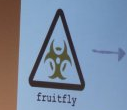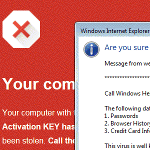Posted by Martijn Grooten on Jan 22, 2018
 VB Editor Martijn Grooten recommends Jean-Philippe Aumasson's 'Serious Cryptography' as a very solid but practically focused introduction to cryptography.
VB Editor Martijn Grooten recommends Jean-Philippe Aumasson's 'Serious Cryptography' as a very solid but practically focused introduction to cryptography.
Posted by Martijn Grooten on Jan 16, 2018
 A Necurs pump-and-dump spam campaign pushing the lesser known Swisscoin botnet is mostly background noise for the Internet.
A Necurs pump-and-dump spam campaign pushing the lesser known Swisscoin botnet is mostly background noise for the Internet.
Posted by Martijn Grooten on Jan 11, 2018
 A 28-year old man from Ohio has been arrested on suspicion of having created the mysterious FruitFly malware that targeted macOS and used it to spy on its victims.
A 28-year old man from Ohio has been arrested on suspicion of having created the mysterious FruitFly malware that targeted macOS and used it to spy on its victims.
Posted by Martijn Grooten on Jan 10, 2018
 At the start of the new year, Virus Bulletin looks back at the threats seen in the 2017 and at the security products that are available to help mitigate them.
At the start of the new year, Virus Bulletin looks back at the threats seen in the 2017 and at the security products that are available to help mitigate them.
Posted by Martijn Grooten on Jan 9, 2018
 Spamhaus's annual report on botnet activity shows that botherders tend to use popular, legitimate hosting providers, domain registrars and top-level domains when setting up command-and-control servers.
Spamhaus's annual report on botnet activity shows that botherders tend to use popular, legitimate hosting providers, domain registrars and top-level domains when setting up command-and-control servers.
Posted by Martijn Grooten on Jan 5, 2018
 As tech support scammers continue to target the computer illiterate through cold calling, VB's Martijn Grooten uses his own experience to share some advice on how to investigate such scams.
As tech support scammers continue to target the computer illiterate through cold calling, VB's Martijn Grooten uses his own experience to share some advice on how to investigate such scams.
Posted by Martijn Grooten on Jan 4, 2018
 Just four days into the new year, two serious attacks in modern processors, dubbed Meltdown and Spectre, have been discovered. The attacks can be mitigated by patches to the operating system, but anti-virus software vendors need to make sure their products are compatible with the patches.
Just four days into the new year, two serious attacks in modern processors, dubbed Meltdown and Spectre, have been discovered. The attacks can be mitigated by patches to the operating system, but anti-virus software vendors need to make sure their products are compatible with the patches.
Posted by Martijn Grooten on Dec 22, 2017
 Martijn Grooten reports on the 20th AVAR conference, which took place earlier in December in Beijing, China.
Martijn Grooten reports on the 20th AVAR conference, which took place earlier in December in Beijing, China.
Posted by Virus Bulletin on Dec 22, 2017
 Virus Bulletin researchers report back from a very interesting fifth edition of Botconf, the botnet fighting conference.
Virus Bulletin researchers report back from a very interesting fifth edition of Botconf, the botnet fighting conference.
Posted by Martijn Grooten on Dec 21, 2017
 (In)security is a global issue that affects countries around the world, but in recent years none has been so badly hit as Ukraine. Today, we publish the videos of two VB2017 talks about attacks that hit Ukraine particularly badly: a talk by Alexander Adamov (NioGuard) on (Not)Petya and related attacks, and another by Robert Lipovsky and Anton Cherepanov (ESET) on Industroyer.
(In)security is a global issue that affects countries around the world, but in recent years none has been so badly hit as Ukraine. Today, we publish the videos of two VB2017 talks about attacks that hit Ukraine particularly badly: a talk by Alexander Adamov (NioGuard) on (Not)Petya and related attacks, and another by Robert Lipovsky and Anton Cherepanov (ESET) on Industroyer.